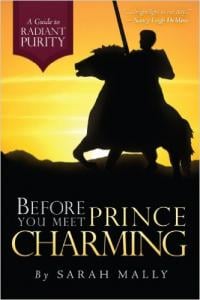 by Mel cross posted from her blog When Cows and Kids Collide
by Mel cross posted from her blog When Cows and Kids Collide
All quotes from Sarah Mally’s ‘Before You Meet Prince Charming’ will be in blue italicized text.
The first portion of the allegory from the chapter on how dreams have to die revolved around the Princess meeting and talking with Sir Valiant for a few minutes. This meeting got her emotions all stirred up since she’s got a crush on Sir Valiant.
Since Sir Valiant doesn’t return to see her again, the Princess’ excitement about being on the verge of having a relationship fades. She does some light-weight work for others – the list includes being hospitable to dignitaries, standing in for her father at functions, sewing for the poor and playing with orphans – then indulges in her favorite past-time: moping and wringing her hands about her future.
One day when she’s especially down she goes for a walk. Her mother follows her and they have a conversation.
“Hearing soft footsteps, she turned around and saw her mother walking behind her. The princess waited but said nothing, telling herself that she was determined not to start crying.
Her mother seem to already know how she was feeling, as mothers usually do, and gently asked if everything was alright.
The princess was silent for a few moments then began to speak slowly. “Years ago I decided that I had a purpose in life much bigger than marriage and that I would gladly stay single if my Heavenly Father asked this of me. Time after time, I have prayed for His will to be done and purposed to be content. And just when I had thought I had finally understood contentment, just when I thought I had finally learned how to patiently wait, Sir Valiant came to visit, and… and… made everything harder. I don’t understand why I can’t learn to trust and I’m so easily distracted. And why- ” she concluded with a sigh, ” why does this have to be so difficult?”
“Struggles are a necessary part of life,” her mother said. “They strengthen us and prepare us for the new trials that lie ahead. When one struggle is overcome, another is often around the next bend.”
“I suppose. But Mother, I feel like I’m failing in each struggle, not overcoming them.”
“Thou art growing. Thou art learning. These are the very things the struggle is designed to accomplish in thy life. Do not forget, dear daughter, that except a corn of wheat fall into the ground and die, it abideth alone: but if it die, it bringeth forth much fruit. ” “(pg. 169)
- No one in this book ever discusses emotions. The Princess sounds sad, scared, discouraged, lonely and self-critical. She’s also infatuated with Sir Valiant. All of these feelings deserve validation from her mother. The royal family ignores all of their daughter’s feelings at their peril:
- The Princess is at least 21 at this point in the book and she’s had minimal life experience. She hasn’t spoken to a friend in years according to the book. Every time she wants to make a choice in her life, her father guilt-trips her about having met Sir Eloquence five years ago and railroads her into staying “pure”. No wonder she feels sad.
- The Princess has been given the same quid-pro-quo promise given to all women through “emotional purity” or Emo-Pur: if she guards her heart vigilantly by staying at home and letting her father lead her romantic life, she will have an early, fertile, romantic and deeply satisfying marriage. The Princess has kept up her part of the bargain and all she has received in return is years of aching loneliness relieved only by circular arguments exchanged with the Allegator. No wonder she feels scared, lonely and discouraged.
- The Princess has received no direct compliments in the whole book. Her parents describe everything positive she does as being based as a given. By doing absolutely nothing, she’s a rose or a candle. When she struggles to follow the way, she’s learning and growing in the way expected of her as a Christian. When she wants to deviate from the way, that’s all her fault. No wonder she’s overly self-critical.
- The Princess has so little exposure to potential mates that she’s having a hard-core crush on a guy who she’s seen on one occasion and talked with for a few minutes total. Having a crush is normal and healthy; being continually distracted by marital fantasies about a man she hasn’t seen in months and has no relationship with is abnormal.
- The most annoying part of the King and Queen is their continual claims that they understand exactly why everything happens in the Princess’ life. The Queen tells her daughter that all of her struggles happen because the daughter still needs to “grow”. On top of being insufferable, that’s an extra-Scriptural claim; the Bible is pretty clear that life is simply hard at times.
- This would be an excellent time for the Queen to commiserate with her daughter. The Queen has to have struggles of her own. She has to have struggled before on some issue. Sharing her feelings and how the situations resolved themselves would be a lot more comforting for her daughter than telling her to suck it up and deal.
“Bear fruit –that is exactly what I want to do,” the princess said quietly, as if deep in thought.
“Then your dream must die. ”
“But my dream is a good dream, not a bad dream. It is the dream that God has given me. It is nothing wicked I desire, but only what is natural, wholesome, and beautiful. Why must it die? ”
Her mother stepped off the path, knelt down, picked up an acorn, and explained, “Observe this acorn, perfectly designed for what it is intended to do – die. The acorn does not know why; the acorn does not understand what is ahead, but only if it is buried in the cold and dark earth –forgotten and alone –does it fulfill its purpose and become what it is created to be. Would the acorn ever have imagined that it would become the beautiful oak tree you see before you? Not in its wildest dreams. When you admire the oak tree, do you mourn the loss of the acorn? Of course not. By losing its life, the acorn becomes something so much greater, so much more beautiful, so much more valuable. The death is forgotten. The fruit is remembered. Nevertheless, death was required.” (pgs. 169-170)
- This section is the only section where the Princess admits that’s she’s got sexual feelings. Oh, it’s always disguised as either vaguely chaste romantic dreams like walking under the stars with a guy or as a longing to be a mother, but the Princess’ has sexual urges. This is the most normal moment the Princess has ever had in the book and one of the most honest moments. The response of her all-wise mother is “Don’t go there! That’s something you have to give up right now!”
- The Queen’s appropriation of the verse about needing to die to bear fruit makes no real sense in the Princess’ life. The traditional interpretation of the verse is that humans as sinners need to overcome selfish desires to follow Christ. The Princess isn’t discussing any selfish desires – even under Emo-Pure guidelines! She’s not saying that she wants to chase after Sir Valiant, wants to go out from her father’s protection. or saying that she questions any of the basic ideas. Having been thoroughly broken in spirit by five years of solitude, she’s more meek than she’s ever been before in the whole book. Remember, the Princess’ sole purpose in the Royal Family’s “ministry” to the kingdom is to show how Emo-Pure is crucial for young adults to fulfill their God-given duty of marriage and reproduction. Her testimony fails miserably if she doesn’t marry and produce kids. The plot hasn’t introduced a more holy ministry that she’s forsaking by wanting to marry and have kids because there is NO other option available in CP/QF theology. That’s the main reason the Queen’s invocation of dying to self falls flat; she’s telling her daughter that following Christ means giving up the only way available for her daughter to follow Christ….
- Do not home-school using ATI/ATIA booklets. Just say no to bad educational texts that teach kids that seeds die before producing plants. That should reduce the number of books written that talk about dead, anthropomorphic acorns.
- Replacing wheat plants with oak trees creates all sorts of problems with the metaphor from the Bible.
- The wheat plant acts in a way that makes the metaphor meaningful because wheat seeds that are buried have a good shot at becoming a wheat plant. Wheat lives for a single season, produces a lot of seeds, scatters the seeds, and the parent plant dies before the seeds germinate.Wheat seeds need to be covered by a small amount of soil to retain enough moisture to germinate but that can be accomplished by forces as common and slight as rain drops, wind, the movement of animals or leaf litter from the parent plant. Since all of the seeds are facing a growing area empty of adult wheat plants at the beginning of the next season, each wheat seed has a good chance of becoming a wheat plant.
- Oak trees are completely different. Oak trees are long-lived perennials that produce massive crops of acorns every few years. The vast majority of acorns will never become oaks and that’s a feature, not a bug of reproduction. Acorns are large enough that they need to be moved away from the parent oak and buried by an animal dispersion agent like a squirrel. To attract the animal dispersal agents, oaks produce heaps of acorns at once. Most of the acorns will be eaten directly or buried by an animal and eaten later. Most of the uneaten, buried acorns will never grow because they are buried too deep, do not receive a signal to grow before the embryo dies or were injured in a way that destroys the embryo’s food supply or the embryo itself. Quantifying exactly how many offspring a plant produces is hard, but the best modeling suggests that the average tree in a forest produces at least 10,000 acorns to have 4-6 offspring survive to seedling age in hopes that 1-2 seedlings survive to maturity.
- Incongruity point: The Queen delivered her whole “Dead Acorn” monologue while kneeling in the dirt. When writing character actions, make sure that the action matches the personality of the character and that the writing conveys the right action. There’s no way a Queen regnant would kneel in the dirt to lecture her daughter about how trees work. Rather than listing every action, keep it simple. If the lead-in said “The Queen picked up an acorn”, the basic idea of the Queen showing an acorn to the Princess is solved without the Queen groveling in the dirt.
That’s the end of the allegory. Literally. The Queen’s kneeling under an oak tree and the Princess never responds to her.
The exhort-and-advise section trots out some memorable (read: odd) anecdotes to support the “Let Your Dreams Die” theme. The net outcome, however, becomes “If you let your dreams die, they come true!” which doesn’t quite fit…..ah, well.
Mel is a science teacher who works with at-risk teens and lives on a dairy farm with her husband. She blogs at When Cows and Kids Collide She is also an very valuable source of scientific information for us here at NLQ. Mel is also blessed with the ability to look at the issues of Quiverfull with a rational mind and break them down to their most basic of elements.
Stay in touch! Like No Longer Quivering on Facebook:
If this is your first time visiting NLQ please read our Welcome page and our Comment Policy!
Copyright notice: If you use any content from NLQ, including any of our research or Quoting Quiverfull quotes, please give us credit and a link back to this site. All original content is owned by No Longer Quivering and Patheos.com
Read our hate mail at Jerks 4 Jesus
Check out today’s NLQ News at NLQ Newspaper
Contact NLQ at [email protected]














